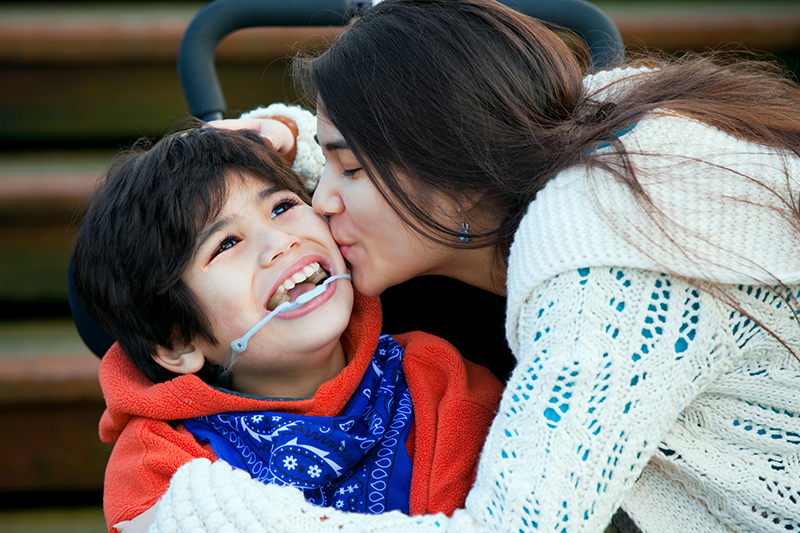Families For Life | Your Child’s Disability: Handling People’s Reactions

People will react in different ways to your child’s disability. With some preparation and planning, you’ll be able to respond constructively to helpful and unhelpful reactions from other people.
How people might react to your child with disability
People will react and respond in different ways to your child with disability.
Some people will be very open and supportive. On the other hand, people can be dismissive and judgmental about children with disability.
Sometimes you’ll respond better than at other times, and that’s OK. If you’re prepared for all sorts of reactions to your child’s disability, you’re more likely to be able to respond the way you want to.
Positive reactions to disability
Most people will be supportive, sensitive and helpful. For example:
‘That sounds pretty tiring. Is there something I can do to help?’
‘It’s such a privilege to work with Kumar. He’s a great kid.’
‘Mei Ling is fantastic at painting. She’s very creative. She might enjoy our after-school art group.’
‘Mei Xuan played beautifully with Selvi today. It’s exciting to see her progress.’
When someone makes a helpful or positive comment, it’s good to respond in a way that opens up the conversation – for example, ‘Thank you, that’s really encouraging’. People are more likely to keep responding to you and your child in this way if you’re positive back to them.
Unhelpful or negative reactions to disability
Sometimes people aren’t sure how to respond so they might say unhelpful or even hurtful things, even if they don’t mean to. For example:
‘She’ll probably grow out of it. Some children are just slow.’
‘There’s nothing wrong with him. Boys are like that – very active and into everything’.
‘What’s wrong with her?’
At other times people just say nasty and hurtful things for their own reasons. For example, sometimes people or children:
have never been taught differently and might say things like, ‘Let’s hide the ball from the kid with the funny eyes’
might not really understand about the disability – for example, ‘Sorry, but we can’t invite him to Yong Quan’s birthday party. We’re having a jumping castle and he couldn’t do that anyway. He’ll just get upset’
give unwanted advice – for example, ‘I know another person who had the same disability and they bought this package from the internet. It fixed it in no time’
want to lay blame somewhere – for example, ‘Is she like that because you worked right up until she was born?’
are just insensitive – for example, ‘Luckily your other children are normal’ or ‘Did his father’s genes cause that? You should have never married him’.
It’s normal to feel upset and hurt by reactions like these, and there’s no one right way to respond. How you respond depends on how you’re feeling, who made the comment and where you are at the time. But it often helps to have some strategies to fall back on when you’re faced with unhelpful reactions.
How to handle unhelpful or negative reactions to disability
Pick your battles
Sometimes you might want to stand up for yourself or your child and correct or challenge a negative comment. If you can stay calm and speak clearly, this can feel very empowering.
But sometimes you might not feel ready for a confrontation, or you might realise it won’t make any difference. In situations like this, it’s OK to let it go. You can just ignore the comment and change the subject.
Use the opportunity to educate
Sometimes you might feel like helping the person by educating them about your child’s disability. For example, ‘Many children with autism spectrum disorder go to regular primary schools’.
If another child asks you about your child’s behaviour or ability, you can answer honestly in language the child can understand. For example, ‘The muscles in Nurul’s legs get tired, so she can’t walk fast’.
Use a standard response
Sometimes a standard response is all you need. For example, ‘It’s complicated to explain. If it’s OK, I’d rather talk about something else’.
Choose not to respond
Sometimes it’s OK to say you just don’t feel like talking about it. For example, ‘I don’t really want to talk to you about this now. Do you mind if we leave it for another time?’. It’s also OK to ignore the comment and not respond at all. For example, ‘Hasn’t the weather been great/awful lately?’
Take a moment before responding
If you pause for a few moments and slow the conversation down before responding to a hurtful comment, you’re more likely to be able to say something constructive and positive. For example, ‘These days, most children born with down syndrome grow up to lead happy, healthy and productive lives’.
If you feel you can, it’s good to let people know that you’re hurt so they’re more careful next time – for example, ‘It hurts when you say things like that’.
Talking to someone supportive
Being constructive and positive is great most of the time, but it’s also completely normal if you need to let off steam sometimes.
When you need to vent your frustrations, try doing it with someone you can trust – like your spouse or a close friend. You could even say, ‘I just need to vent. You don’t need to fix it for me. Just let me talk for a while’.
If you’re finding other people’s reactions particularly difficult to deal with, or you find that you’re often getting upset, it might be helpful to seek professional support for counselling or specific advice.
It can help to talk to parents in similar situations to yours. You could try a support group for parents of children with disability or a playgroup for children with disability.
© raisingchildren.net.au, translated and adapted with permission
Explore more